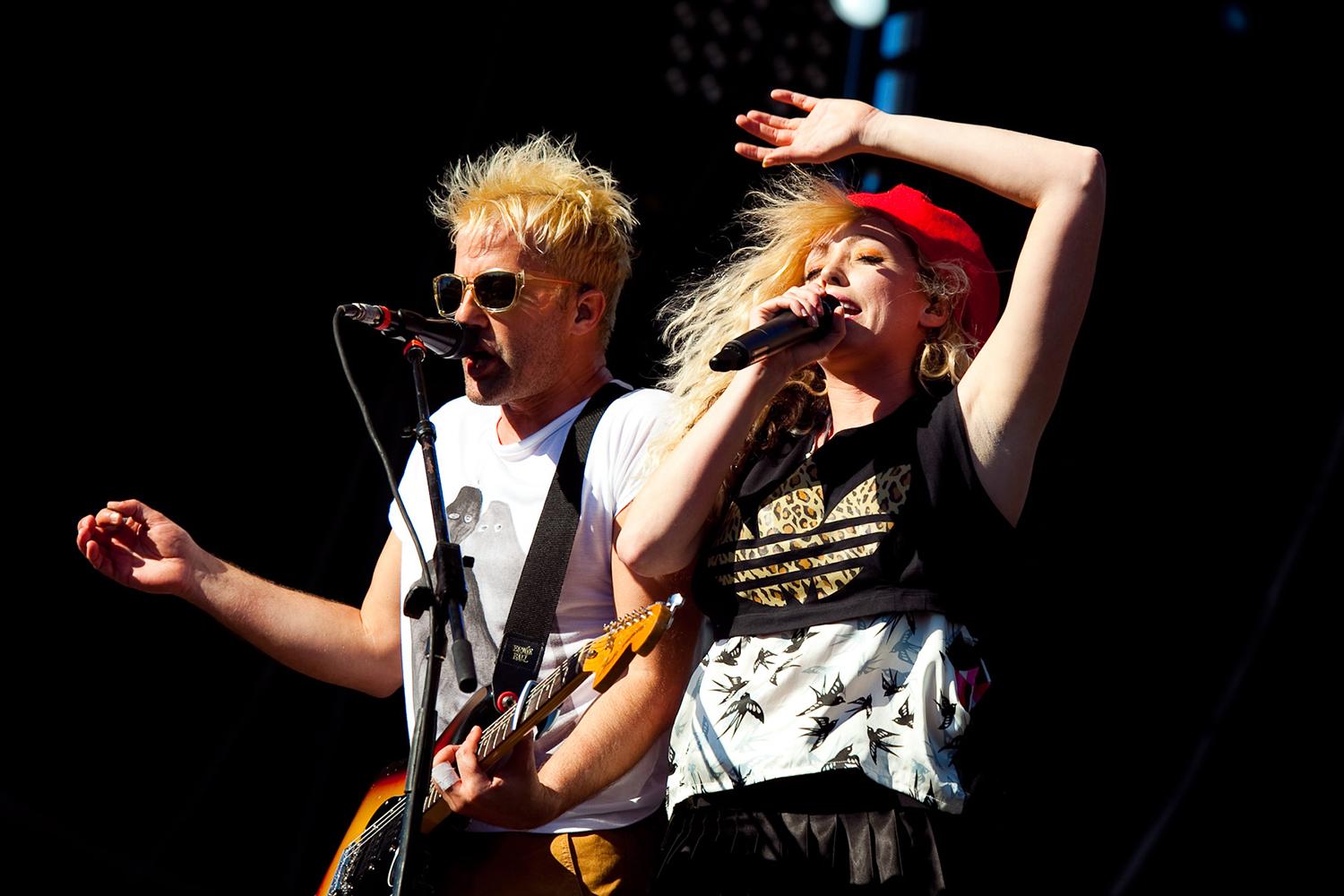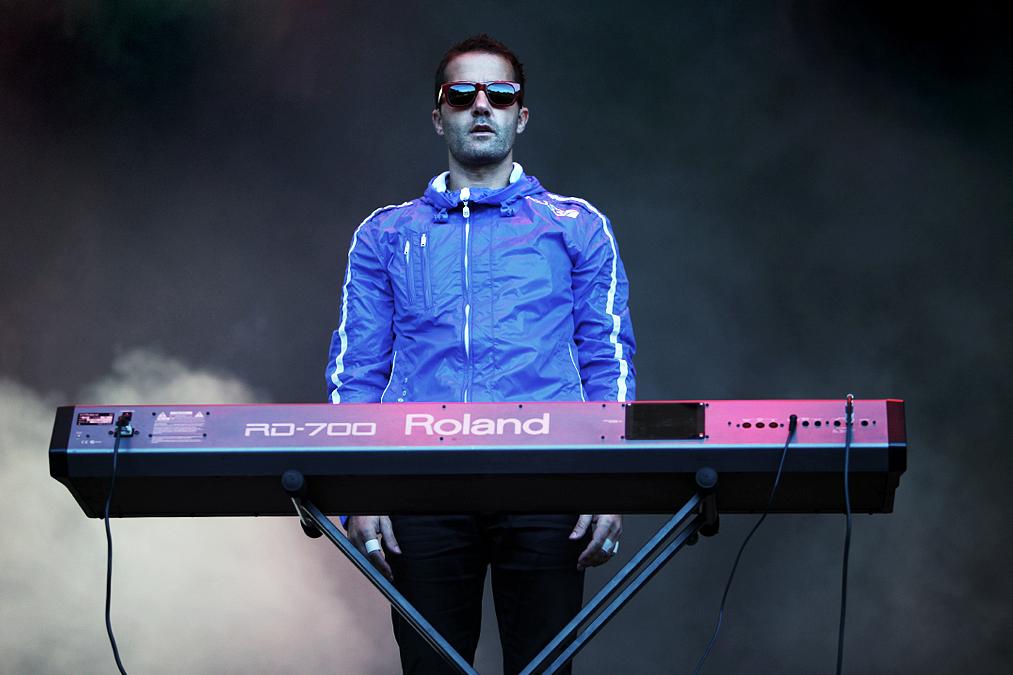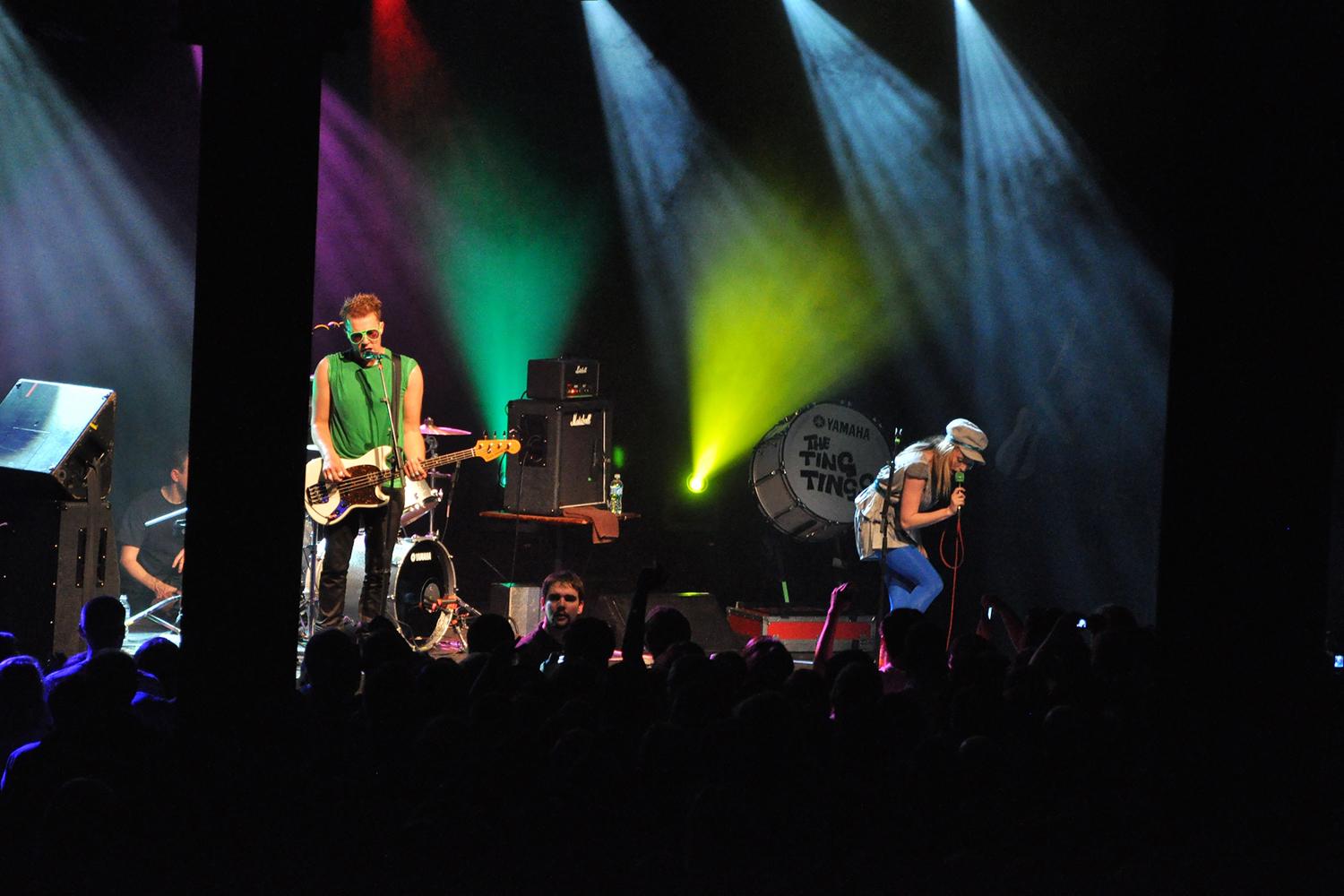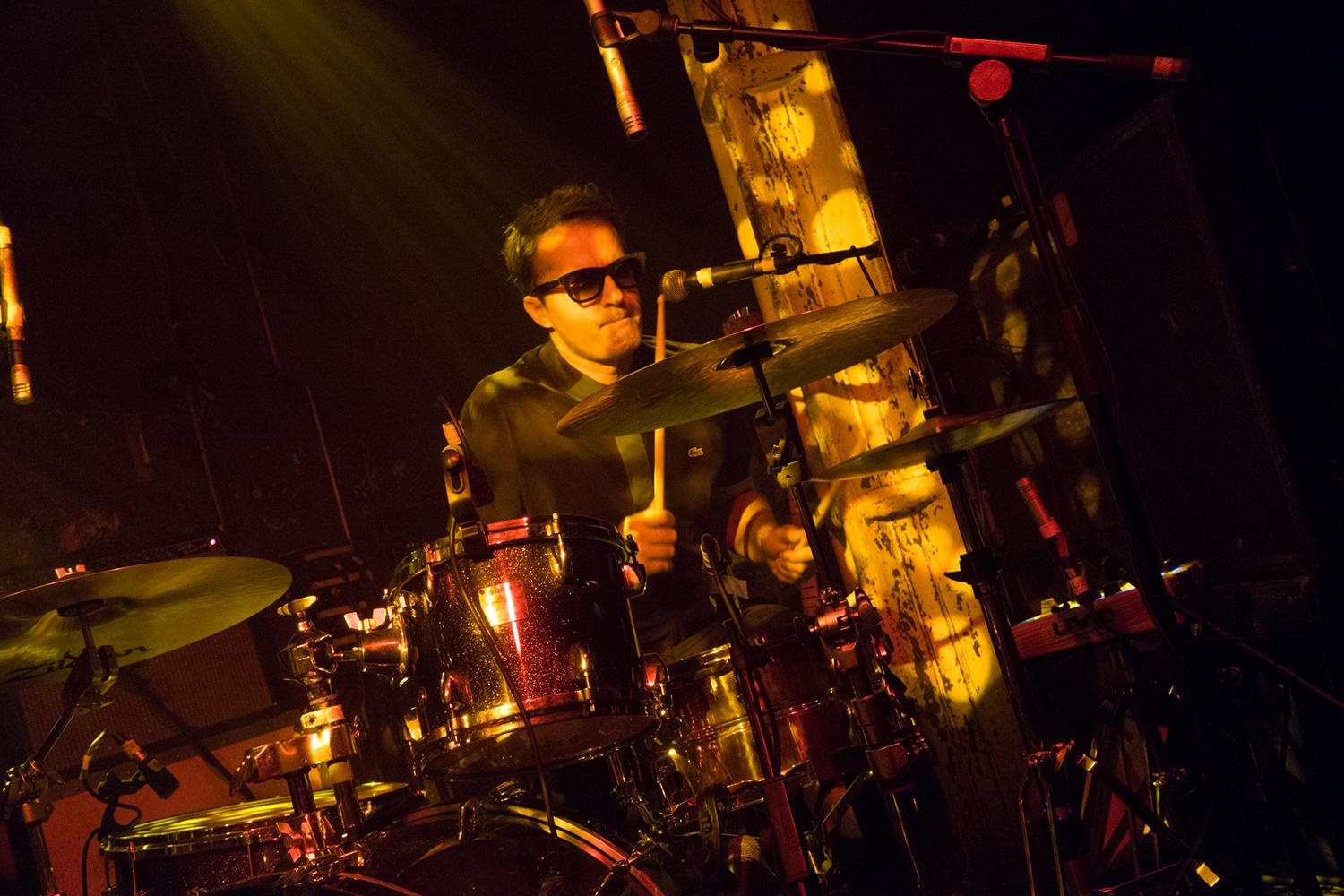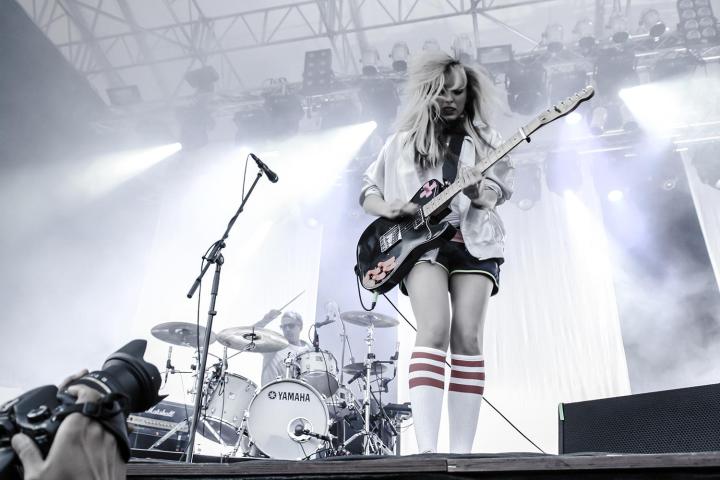
“I’m a bit bored with EDM.”
Katie White of The Tings Tings is lamenting the fact that she’s reached her BPM limit when it comes to modern EDM. “I don’t think every dance-oriented record that comes out has to be that fast,” she tells Digital Trends. “I wanted our record to slow down the BPM so people could really, really dance to it.”
It’s a tough crossroads to be at when you’re trying to figure out what comes next after establishing your sound with highly percussive, electronic-driven chart-toppers like That’s Not My Name, Shut Up and Let Me Go, and Great DJ. Those tracks, from 2008’s We Started Nothing, were fueled by Jules De Martino and White’s inventive techno beats and White’s infectious, can’t-help-but-sing-along-to vocals.
“[Analog tape is] such an artform, really; such a different way of working.”
After a sideways stutter-step with 2012’s Sounds From Nowheresville, the Tingsters decamped to Ibiza where they became fast friends with Duran Duran guitarist Andy Taylor. Taylor became their co-producer and helped the pair sift through their demos to find the right nine cuts for the dance-driven Super Critical, released digitally via their own Finca Records label last December and now finally made available in physical formats here in the new year.
Songs like the funk-tastical Wrong Club, the guitar-blasted Do It Again, and stacked-vocal and horn-centric Green Poison all reinforce the fact that the super-critical key to Super Critical was recording it all analog — a first for the band. White, 32, called Digital Trends from across the Pond to discuss that all-important no-digital decision, BPM club dreams of years past, and her Stevie Nicks obsession. They call you creative resurgence, Katie — that is your name.
Digital Trends: I’m really glad you went with the analog approach for Super Critical. That whole vibe is present across the entire album.
Oh, thank you. We loved it. It was the first time we’d done something like that. We’re addicted to it now. I can’t imagine making a record that’s not put onto tape, oh my God.
Normally we make the records ourselves — in our living room with just a little Pro Tools setup, and that’s it. But instead, we booked Avatar Studios in New York for like six weeks, with [co-producer] Andy Taylor. And within about three or four weeks, it was going so well that we actually finished the record early. We were so happy with it. We had about two weeks left, just to have fun. So we’re in this beautiful studio, with all that beautiful analog tape, and we’d watched a documentary on 10CC — [sings], “We’re not in lo-ove…”

Right, I’m Not in Love, from the ’70s band 10cc. You wound up using their mixing-board “style” when you were working on the song Communication.
Yes! As you kind of know, 10CC recorded the whole spectrum of chords. They put it up on the mixing desk, and played it like a keyboard. So we did that too.
I love that big keyboard-wash break in the middle of Communication. The vocal breakdowns you have in there are spectacular.
It took days to do! As a band, we felt so lucky, because most musicians don’t have the opportunity to fit in that kind of studio with two weeks to “waste,” and have fun just using the big desk. It was an amazing experience.
I’ve been to Avatar Studios a quite a few times. What a great sound you can get in there. I just love the classic Power Station vibe they still have.
And Andy, from Duran Duran, named his other band after that place [Power Station]. It was a different world to us. With Andy, we had a different approach to recording. We wouldn’t have known how to start on analog tape. But now we’ve learned. It’s such an artform, really; such a different way of working. It’s almost like a film cam, you know? You’ve only got a certain amount of tape to put the takes onto, so you change the way you perform. With Pro Tools, you can do it a thousand times.
Is there a song you could cite where, if you had done it digitally, you would have taken a different approach than the way you did in analog?
I mean, all of them, really. What’s interesting is, we wrote the album in Ibiza. It sounds really pathetic, and I feel like a teenager for saying this, but we smoked a lot of weed (both laugh), and then we ditched it.
“We got absolutely obsessed with watching documentaries about Studio 54 and CBGB, going, ‘Why don’t clubs like that exist anymore?’”
In other words, are you saying you came to your senses? (both laugh)
Yeah. What happened was, we had a difficult time with our second album [Sounds From Nowheresville, 2012]. We overthought it. There were too many opinions before we’d even written it, you know? Before we got to Ibiza, we never would have written lyrics with the word “baby” in them. At that time, we were like, “But it sounds good!” It really loosened us up.
And working with Andy, like I said, was a brand new experience for us. Before, we had just made the records ourselves, in a little room. We thought working with someone else — anyone, I mean, not just Andy — would make us, I don’t know, quite shy in the studio. But since he’d become a good friend of ours over about a year, it was really enjoyable. And I think we both already knew we’d like to find somebody else we’d feel comfortable with.
Did you know much about Duran Duran before you met Andy? Were you familiar with them at all?
I knew some of their hit songs, but I was born in ’83, so I kind of missed them, really. I didn’t know who Andy was. I just thought he was a weird guy. [laughs] He walked in the studio, and he still has the hair and the glasses. When I saw him walk in, I thought, “Who the hell is this guy?” I didn’t know. But he’s a really interesting guy, especially when it comes to his music.
Ibiza is famous for its clubs, EDM, and techno scenes. What would happen when you’d go out on the town?
Anytime I’d go out, I’d come back to the studio, flop down on the sofa, and go, “Awww, you can’t even dance to it! I mean, it’s good, but you’ve got to take, like a ton of drugs!”
The song Wrong Club is absolutely the perfect commentary on that whole scene, then.
Wrong Club is exactly that — being in that club at 4 in the morning and re-evaluating your life, and why you’ve ended up there. [chuckles]
I’m sure you’d rather be in Studio 54, circa 1978.
Yeah, absolutely. We got absolutely obsessed with watching documentaries about Studio 54 and CBGB, going, “Why don’t clubs like that exist anymore?”
The biggest thing we saw was the BPM was slower. So people danced, because you could dance to it. A big, conscious decision that we made on this album was to slow down the BPM. It’s kind of an odd thing now. Imagine if you’re a DJ, and our record is up. This record wouldn’t fit in with the BPMs being played. But we thought, “Fuck it, that’s what we want to do.” We definitely set a mood.
I’m ok with that — Super Critical has kind of a Nile Rodgers/Chic/Duran/Power Station thing going on. You’re tapping into people who remember all that, or the new people who say, “Oh yeah, I can get into this more than EDM.”
Yeah. I’m a bit bored with EDM. I am. I’m a bit bored with it. It’s been flying high for a few years, and it’s great, and there is a place for it. But I don’t think every dance-oriented record that comes out has to be like that. This record shows that that doesn’t have to be the case.
Were there other records that influenced your “slower BPM” approach?
Oh, it’s not just albums, it’s scenes. We’d sit there and go, “Can you imagine being Blondie in CBGB, playing Rapture? It was that perfect moment in time — it’s kind of like disco, but it’s punk, and it’s new wave; it’s all those things mixed together. All the styles of music that we love, that we go back to as a band for references, are all in there.
“EDM has been flying high for a few years, and it’s great. But I don’t think every dance-orientated record that comes out has to be like that.”
And Donna Summer, who I also love — she just sounds so fresh now. Madonna’s first album, early Prince, and Chaka Khan, that really funky [sings], Tell me something good! [by Rufus and Chaka Khan, 1974, and written by Stevie Wonder]. You don’t really hear it as much now, unless you search it out. And then when you play it, it doesn’t matter if you’re a 16-year-old or a 50-year-old — you just have to move to it.
You guys have really captured that sensibility on Super Critical. Since there’s so much detail to discover in your mixes, what do you think the best format is for hearing your music — high-resolution files, or on vinyl?
Vinyl. I love vinyl. What’s interesting at the moment in the U.K. — I don’t know how it is in the States — but vinyl has a big resurgence. I think it just hit a million sales in the U.K., which is like the first time in years and years vinyl has sold that much. We’ve always made sure our albums come out on vinyl.
I know — I bought the first two on vinyl myself, and I’m ready for the third. What do you love about the LP format?
Well, especially when you just made a record on analog tape and put it out on vinyl, it’s just the air and the warmth in it, you know? You don’t realize why you love something or why it makes you feel warm, but we didn’t know what we were missing in the making of the first and second album. It was always like, we put so much in and they were so worthy, and in a way that gave them their style as well. But for this album to have a little bit of air is really good, and it instantly sets the mood. That’s something we’ve just learned.
I think about a track like Wabi Sabi, which brings things down after Wrong Club and has a different flow. We hear those really great vocal harmonies — it’s kind of your Fleetwood Mac harmony moment, your Stevie Nicks thing.
Yeah, I got obsessed with Stevie Nicks. She’s amazing. We have a song called Only Love, and I was really studying her writing and especially her words, because it has all those elements — it’s all about wind and fire and rain and the moon. It’s an interesting read when you go through her lyrics.
I think Lindsey Buckingham is still underrated as a player, producer, and songwriter.
Oh yeah! A dream of ours would be to talk to Lindsey Buckingham, and then drug him, and then ask him to make our record. [laughs]
Getting back to the sound you guys got here — was that a Kaoss pad you used on Daughter?
Yeah, yep. We did the track, but we felt we needed something a little bit harsher on the album. We kept trying things, and we had this Kaoss pad, which was really easy to whip your hand across. And then we just picked the best take. It almost destroys the song a bit, but I think it makes it spiky as well.
Will you do anything different in your live show because of the way you recorded this album? It’s just the two of you onstage.
Even on the first album, we always seemed to change things a bit live, to give it more energy. We’re not the kind of band that would just stand there strumming and singing. We’ve just toured Japan, Europe, and the U.K., and in a way, we kind of make it more punk and edgier than the album. And that works. I think when you go see a band, you want energy. I don’t think it would do to stand still in a song. But I wouldn’t expect a polished pop show. [laughs] We make mistakes all the time.

